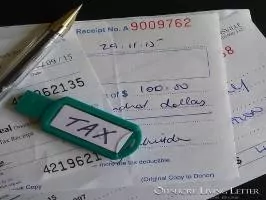
FATCA, FBAR, And Finding An Offshore Tax Advisor
With So Many Forms To File, How Do You Know Where To Turn?
A reader recently forwarded an article to me that had been published in his local expat paper. The topic was U.S. taxes.
The author represented himself as a U.S. offshore tax preparer… and an expat himself.
I wouldn’t want this guy anywhere near my tax return. Most of the information in the article was either outright wrong or muddled two different filing requirements—the FBAR (Foreign Bank Account Report) and Form 8938 (the form implemented as a result of FATCA for the reporting of foreign financial assets).
This week a colleague forwarded a BBC article to me. The topic was FATCA and Americans renouncing their citizenship because of the problems they are having opening bank accounts in Europe. One specific American’s story was told in detail.
Even The BBC Gets This Stuff Wrong!
While many Americans are renouncing their citizenship because of FATCA, some particulars of the article were confused and, as in the piece from the offshore tax preparer guy, flat out wrong.
The article stated, for example, that savings are taxed under FATCA, which simply is not the case. Savings aren’t taxed. However, a savings account in a foreign bank and the money in it are reportable if you meet the reporting thresholds for either the FBAR (US$10,000) or Form 8938 (US$200,000 for a single person living outside the United States, as was the example lady in the article).
Between self-purported experts who don’t actually know anything and major news agencies such as the BBC publishing inaccurate information, it is no wonder that Americans are confused about the filing requirements and tax implications of living and investing outside the United States.
Going Offshore Doesn't Have To Be Complicated
Putting aside the challenges FATCA has created for Americans (in fact, for everyone) wanting to open bank accounts overseas, the filing requirements and the related taxes for Americans going offshore don’t have to be complicated.
Buy a second home in another country and take title to the property in your own name. Do that, and you have nothing to report to the IRS. Rent out the home and you’re meant to report the rental income on your U.S. tax return… along with the associated expenses of managing the rental. Then you calculate your taxable income, just as you would for a rental property you owned in the United States.
Put the home you buy overseas in an offshore entity (say, an LLC), and you have IRS forms to complete to report the offshore LLC even if you don’t earn any rental income from the property. In this case, you’ll also likely hit the Form 8938 filing threshold, if you’re living in the United States, which is only US$50,000 for a U.S. resident (US$100,000 for a couple filing together). The LLC qualifies as a foreign financial asset, which is what Form 8938 is used to report.
Of course, the more offshore investments you make and the more entities you form to hold offshore assets, the more complicated your tax filings become.
Finding An Offshore Tax Advisor
When you get to the point where you need help staying compliant with your U.S. tax filing obligations, where can you turn for advice and information, given that you can’t believe everything you read on this topic online, even when it comes from big-names sources?
If you already work with a tax advisor in the United States, start with him (or her).
The unfortunate reality, however, is that, even if your U.S. tax advisor is a CPA, he likely has little or no idea about the forms required for reporting offshore investments and income. Most U.S. tax preparers have never had to prepare a Form 2555 for the Foreign Earned Income Exclusion or a Form 8938 to report foreign financial assets or a Form 5741 for an offshore corporation.
I don’t advise working with someone who fits that description—that is, you don’t want to work with a tax advisor or preparer who has limited experience with offshore reporting. You don’t want to be his guinea pig.
You could learn the rules yourself, as I’ve done.
Over the last 18 years I’ve been living overseas full-time, I’ve educated myself on U.S. offshore tax issues. They don’t change much—though FATCA added a new burden and learning curve. Training yourself on the basics isn’t a hugely high hurdle.
However, for complicated things, I suggest hiring a professional. Again, though, you want to work with someone with experience preparing returns for and meeting the filing requirements specific to people living and investing offshore.
I don’t know many guys who qualify, but I do know one. Vincenzo Villamena can help you decipher your filing requirements when going offshore. He’s a U.S. tax expert, a CPA, and an expat himself.
If you’re an American confused about the filing requirements associated with your offshore activities, Vincenzo would be one guy I’d trust for sound advice.
Lief Simon
“Lief, I purchased 1 hectare of land in the second mango farm in Panama a few months ago. Since you have been recommending this investment for quite a while, could you give the investors any guidance regarding U.S. taxes? I don’t think the Form 8938 applies to me, but I’m not sure about the FBAR?
“I’m looking forward to your Colombia conference!”
J.S.
If you take title to the mango land in your own name, you don’t have to report owning the asset.
The FBAR is for financial accounts. Form 8938 is for financial assets.
In other words, the FBAR wouldn’t come into play at all. Form 8938 wouldn’t come into play even if you take title to the land in an entity, as it’s just 1 hectare and the value wouldn’t exceed the Form 8938 filing threshold.
However, if you take title in a non-U.S. entity, you would have to report the entity.
See you in Medellín.



